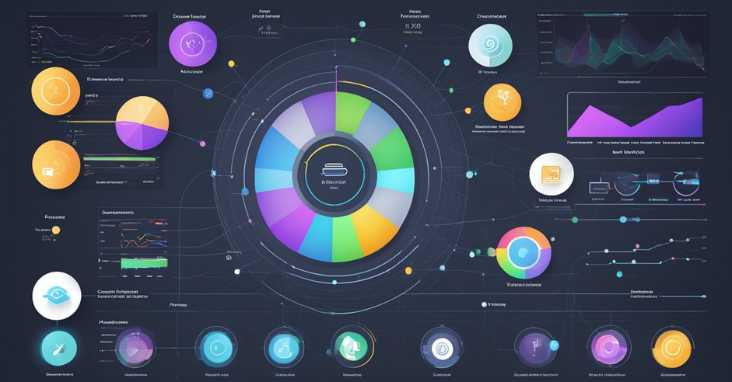What are advanced event systems? Advanced event systems are tech solutions that streamline planning, coordination, and management of events for efficiency and success.
Advanced event systems (AES) are becoming increasingly popular in the event management industry. These systems are designed to streamline the event planning process by automating many of the tasks that were previously done manually. AES can be used for a wide range of events, from small meetings to large conferences and festivals.

Fundamentals of Advanced Event Systems
At the core of AES is the ability to manage all aspects of an event from a single platform. This includes everything from registration and ticketing to scheduling and marketing. By consolidating these functions into one system, event planners can save time and reduce the risk of errors or oversights.
Core Features of AES
Some of the key features of AES include integrations with other software platforms, such as email marketing tools and social media platforms. AES can also provide detailed performance metrics, allowing event planners to track attendance, engagement, and other key indicators. Additionally, AES can help with planning and scheduling, making it easier to manage multiple events simultaneously.
Key Takeaways
- Advanced event systems can streamline the event planning process and reduce the risk of errors or oversights.
- AES can integrate with other software platforms and provide detailed performance metrics.
- AES can help with planning and scheduling, making it easier to manage multiple events simultaneously.
For more information on AES, check out this resource from Eventbrite.
Fundamentals of Advanced Event Systems
Defining Advanced Event Systems (AES)
Advanced Event Systems (AES) are sophisticated software tools that enable event planners to manage and organize events of all types and sizes. These systems are designed to streamline the event planning process, from registration and ticketing to scheduling and logistics. AES can be used for a wide range of events, including conferences, trade shows, festivals, and sporting events.
AES typically includes a range of features, such as online registration, attendee management, session scheduling, and event marketing. These features are designed to help event planners save time and reduce costs, while also improving the attendee experience.
History and Evolution of AES
The use of technology in event planning has been around for decades, but it wasn’t until the 1990s that AES began to emerge as a distinct category of software tools. The first AES were basic registration and ticketing systems, but they quickly evolved to include a range of features and functionalities.
Today, AES have become an essential tool for event planners of all types. They have become more sophisticated and user-friendly, and they are now accessible to a wide range of organizations and individuals.
One of the key drivers of the evolution of AES has been the rise of mobile technology. With the widespread adoption of smartphones and tablets, event planners can now use AES to manage events on the go, from anywhere in the world.
Overall, AES have revolutionized the event planning industry, making it easier and more efficient than ever before to organize and manage events of all types and sizes.
To learn more about the history and evolution of AES, check out this resource.
Core Features of AES
Advanced Event Systems (AES) is a powerful tool for managing events, teams, schedules, and results. Here are some of the core features of AES that make it stand out from the competition.
Team Management
With AES, managing teams has never been easier. The system allows you to create and manage teams, assign coaches and players, and track their progress over time. You can also create custom fields to store additional information about each team, such as contact details, team history, and more.
Event Scheduling
AES makes it easy to schedule events and manage your calendar. You can create events, assign venues, and set up schedules for each event. The system also allows you to manage registrations, payments, and other important details.
Results Tracking
AES tracks results in real-time, allowing you to see how your teams are performing at any given moment. You can view standings, scores, and other important data at a glance. The system also allows you to generate reports and export data to other systems.
Overall, AES is a powerful tool that can help you manage your events more efficiently and effectively. Whether you’re a coach, event organizer, or team manager, AES has the features you need to succeed.
For more information about AES, check out this helpful resource.
Integrations and Partnerships
SportsEngine HQ Integration
SportsEngine, a leading provider of sports management software, has integrated with the advanced event systems to streamline the registration process for sports tournaments and events. This integration allows event organizers to easily sync participant data and schedules between SportsEngine HQ and the event system, reducing the need for manual data entry and minimizing errors.
With the integration of SportsEngine HQ, event organizers can easily manage team and individual registrations, track payments, and communicate with participants all in one place. This integration has been well received by sports organizations and event organizers, as it has simplified the registration process and saved them time and resources.
NBC Sports Next Collaboration
The advanced event systems have also partnered with NBC Sports Next, a division of NBC Sports Group, to provide advanced event management solutions for sports tournaments and events. This collaboration has enabled event organizers to leverage the expertise of NBC Sports Next in event production and management, while also benefiting from the advanced event systems’ technology.
Through this collaboration, event organizers can access a range of services, including event marketing, live streaming, and content creation. Additionally, the advanced event systems’ technology provides real-time data and analytics, allowing organizers to make informed decisions and improve the overall event experience for participants and spectators.
Overall, these integrations and partnerships have been instrumental in advancing the capabilities of the advanced event systems. By working with industry leaders such as SportsEngine and NBC Sports Next, the advanced event systems have been able to provide a comprehensive solution for sports event management.
Implementation in Youth Sports

Case Studies: Volleyball Events
Advanced event systems have been implemented in various youth sports, including volleyball. These systems have helped to streamline the organization and management of volleyball events, making them more efficient and enjoyable for all involved.
One notable case study is the use of advanced event systems for the annual youth volleyball tournament held in Springfield, Illinois. The system allowed for online registration, scheduling, and scorekeeping, which reduced the workload on event organizers and provided real-time updates for participants and spectators. This resulted in a smoother and more enjoyable experience for all involved.
Another case study is the implementation of advanced event systems for the annual volleyball camp held by the University of Nebraska. The system allowed for personalized schedules, skill assessments, and progress tracking, which provided a more individualized and effective learning experience for participants.
Coach and Team Adoption
The adoption of advanced event systems in youth sports has also been influenced by coaches and teams. Coaches have recognized the benefits of these systems in terms of organization, communication, and performance tracking. Teams have also seen the benefits in terms of improved team dynamics and overall performance.
For example, the use of advanced event systems for a youth volleyball team has allowed for improved communication between coaches and players, as well as more efficient practice scheduling and performance tracking. This has resulted in a more cohesive and successful team.
Overall, the implementation of advanced event systems in youth sports, particularly in volleyball events, has provided numerous benefits for all involved. Coaches, teams, and event organizers have all recognized the value of these systems in terms of organization, communication, and performance tracking. As such, it is likely that the adoption of these systems will continue to grow in the future.
For more information on the implementation of advanced event systems in youth sports, please refer to this article.
User Experience

The AES platform is designed with the user in mind, providing a seamless experience that is both intuitive and efficient. In this section, we will explore two key aspects of the user experience on the AES platform: Navigating the AES Platform and Mobile Accessibility and Apps.
Navigating the AES Platform
One of the key strengths of the AES platform is its ease of use. The platform is designed to be intuitive, with clear and concise navigation menus that make it easy to find what you are looking for. The main dashboard provides an overview of all upcoming events, and users can easily filter and search for specific events using the search bar.
In addition to the main dashboard, the AES platform also provides a comprehensive event management system, allowing users to create and manage events with ease. The event management system is designed to be flexible, allowing users to customize their events to suit their specific needs.
Mobile Accessibility and Apps
In today’s fast-paced world, it is essential that event management platforms are accessible on mobile devices. The AES platform is fully optimized for mobile devices, allowing users to access all features and functionalities on the go.
In addition to mobile optimization, the AES platform also provides dedicated mobile apps for iOS and Android devices. These apps provide users with a seamless and intuitive experience, allowing them to manage their events from anywhere, at any time.
Overall, the user experience on the AES platform is second to none. With intuitive navigation, flexible event management, and mobile accessibility, the AES platform is the perfect solution for event organizers looking for a comprehensive and user-friendly event management system.
Here is an external resource that provides insights into the importance of mobile accessibility in user experience.
Performance Metrics

Analyzing Event Success
To determine the success of an event, various performance metrics can be used. One common metric is the number of attendees, which measures the popularity of the event. Another important metric is the engagement level of attendees, which can be measured by analyzing social media activity during the event.
In addition to these metrics, event organizers can also measure the success of their event by analyzing feedback from attendees. Surveys and feedback forms can be used to collect valuable insights and suggestions for improvement.
Team and Player Standings
In sports events, team and player standings are important performance metrics that are used to determine the success of a team or individual player. These standings are typically based on factors such as the number of wins, losses, and ties.
To ensure accuracy and fairness in these standings, advanced event systems can be used. These systems can track and analyze data in real-time, providing up-to-date standings and statistics for teams and players.
Overall, performance metrics are essential for evaluating the success of an event and identifying areas for improvement. By using advanced event systems and analyzing key metrics, event organizers can ensure that their events are successful and engaging for attendees.
For more information on analyzing event success, check out this helpful resource.
Planning and Scheduling

Setting Up Event Dates
One of the most important aspects of event planning is setting up the dates. It is crucial to choose a date that is convenient for the majority of the attendees. The date should be selected in such a way that it does not conflict with any major events or holidays. This can be done by conducting thorough research and consulting with the stakeholders.
Once the date is finalized, it is important to communicate it to all the stakeholders and attendees. This can be done by sending out emails, creating social media posts, or using event management software. By communicating the date well in advance, attendees can plan their schedules accordingly.
Streamlining Event Timelines
The success of an event depends on the efficient management of time. It is important to create a timeline for the event that includes all the important activities such as registration, keynote speeches, panel discussions, and networking sessions. This can be done by creating a Gantt chart or using event management software.
It is also important to allocate sufficient time for each activity and ensure that the schedule is followed strictly. This can be achieved by having a dedicated team that manages the event timeline and ensures that all the activities are completed on time.
By streamlining the event timeline, attendees can make the most of their time and have a positive experience. It also ensures that the event runs smoothly and is successful.
For more information on event planning and scheduling, check out this resource, which provides valuable insights and tips on how to plan and schedule events effectively.
Marketing and Outreach

Leveraging Testimonials
One of the most effective ways to market an event is through the use of testimonials. Testimonials are statements from previous attendees or participants in an event that highlight the positive aspects of the event. These statements can be used on promotional materials, social media, and the event website to promote the event to potential attendees.
To leverage testimonials effectively, event organizers should reach out to previous attendees and ask them to share their experiences. These testimonials should be authentic and highlight the unique aspects of the event. Event organizers can also consider offering incentives, such as discounted tickets or exclusive access, to attendees who provide testimonials.
Engagement Through Videos
Videos are another effective way to engage potential attendees and promote an event. Event organizers can create promotional videos that showcase the event’s highlights and unique features. These videos can be shared on social media, the event website, and other promotional materials.
To create effective promotional videos, event organizers should focus on capturing the energy and excitement of the event. They can also consider including interviews with previous attendees or participants to provide a personal perspective on the event.
Additionally, event organizers can leverage user-generated content by encouraging attendees to share their own videos from the event on social media using a specific hashtag. This can help to create a sense of community around the event and encourage others to attend.
By leveraging testimonials and videos, event organizers can effectively market their events to potential attendees and create a sense of excitement and engagement. For more information on event marketing and outreach, check out this helpful resource.
Data Management and Security

Data management and security are critical components of any advanced event systems. With the increasing amount of data being collected and processed, it is essential to ensure that user information is protected from unauthorized access and that data analytics and reporting are accurate and reliable.
Protecting User Information
Protecting user information is a top priority for event organizers. With the rise of cyber threats and data breaches, it is crucial to implement robust security measures to safeguard user data. This includes using encryption technologies to secure data in transit and at rest, implementing access controls to restrict unauthorized access, and regularly monitoring and auditing the system for any potential vulnerabilities.
To further enhance security, event organizers can also consider partnering with reputable third-party security providers. These providers offer advanced security solutions that can help prevent data breaches and ensure that user information is protected at all times.
Data Analytics and Reporting
Data analytics and reporting are essential components of any advanced event systems. They provide organizers with valuable insights into attendee behavior, preferences, and engagement levels, which can be used to improve future events and drive business growth.
To ensure accurate and reliable data analytics and reporting, event organizers must implement robust data management practices. This includes using data validation techniques to ensure that the data being collected is accurate and complete, implementing data cleansing procedures to remove any duplicate or erroneous data, and using data visualization tools to help make sense of complex data sets.
In addition, event organizers can also consider partnering with reputable data analytics providers. These providers offer advanced analytics solutions that can help organizers gain deeper insights into attendee behavior and preferences, and make more informed decisions about future events.
Overall, data management and security are critical components of any advanced event systems. By implementing robust security measures and data management practices, event organizers can ensure that user information is protected and that data analytics and reporting are accurate and reliable.
Frequently Asked Questions

How do I register for a volleyball tournament through Advanced Event Systems?
To register for a volleyball tournament through Advanced Event Systems (AES), simply visit their website and search for the tournament you are interested in. Once you find the tournament, click on the registration link and follow the instructions provided. If you have any questions or encounter any issues during the registration process, AES offers a dedicated customer support team to assist you.
What is the process for checking volleyball rankings on AES?
Checking volleyball rankings on AES is a straightforward process. Simply visit their website and navigate to the rankings section. You can search for rankings by age group, region, and other criteria. AES updates their rankings regularly, so you can be confident that you are viewing the most up-to-date information.
Can I find the schedule for upcoming volleyball tournaments on AES?
Yes, you can find the schedule for upcoming volleyball tournaments on AES. Simply visit their website and search for the tournament you are interested in. The schedule will be listed on the tournament page, along with other important information such as location, registration deadlines, and rules.
Is there a mobile platform available for accessing information on AES volleyball events?
Yes, AES offers a mobile app that allows you to access information about volleyball events on the go. The app is available for both iOS and Android devices and provides a user-friendly interface for viewing tournament schedules, rankings, and other important information.
What features does Advanced Event Systems offer to manage volleyball tournaments?
AES offers a wide range of features to help manage volleyball tournaments, including online registration, scheduling, bracketing, and scoring. They also provide real-time updates and live streaming options, as well as a dedicated support team to assist with any issues that may arise.
How do I navigate the AES website to find specific volleyball tournament details?
Navigating the AES website to find specific volleyball tournament details is simple. You can use the search function to quickly find the tournament you are interested in, or browse by region, age group, or other criteria. AES also provides a comprehensive FAQ section and customer support team to assist with any questions or concerns you may have.
For more information on Advanced Event Systems and their volleyball event management services, visit their website.



